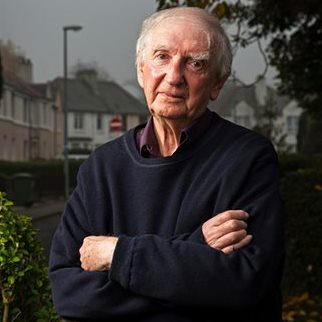Kids welcome at the door: Remembering Bob Holman
by Graham Connelly

Bob Holman was born in the east end of London in 1936. At the age of three he was evacuated to the country – an unhappy experience which he later wrote about, but it was a major influence on his later work and writing – and was effectively parented by his older sister, then aged six. By the end of the war, Bob had hardly attended school and at age ten did not know the alphabet. Unsurprisingly, he failed the '11-Plus' examination, twice, but, as his wife Annette explained at the celebration, a new Grammar school was set up locally and Bob got a place 'as one of the top fails'.
That accident of circumstance allowed Bob to develop academically, but he was conscious of his fortune and was an outspoken critic of educational inequality. He then had a rather conventional academic career: University College, London – eschewing Oxford to his former headmaster's annoyance because he'd met 'Oxford-types of the officer class' during national service – the London School of Economics, and a PhD at the University of Birmingham. He trained in social work, meeting and falling in love with Annette when they were assigned to the same placement, became a children's officer, and was later appointed to lectureships in social work, before becoming professor of social policy at the University of Bath.
As Bob himself explained in a radio interview two years ago, the family acquired the trappings of success: a detached house, two cars and good salaries. 'We were made.' But Bob began to feel that his lifestyle was at odds with his strong Christian faith and, with Annette's support, in 1975 he resigned his academic post, the family moved to the Southdown district of Bath and Bob offered his skills on behalf of the community. Those practical helping skills – writing letters, completing complicated forms, advocating at courts and tribunals, providing transport, helping to set up play-schemes and community groups – were later deployed in Easterhouse, Glasgow after Bob and Annette moved there in 1987.
That was the year I met Bob, but it was in London when we were helping plan an Open University course on working with children. We met properly when heading for the same train to Glasgow. I confessed that I had no experience in academic writing and was not sure I had much to offer the course. Later in the conversation Bob told me about a woman he had helped, initially by writing letters for her and then encouraging her to write herself. The woman wrote a story about her life and Bob helped her get it published by The Guardian; she was now editing a community newspaper. I realised that while Bob was telling me about his work, the story was really directed to me. On another journey we discussed sport and I must have let slip my passion for skiing and possession of a ski leader qualification. 'What you doing next Wednesday?' I learned that I would be teaching youngsters from Bob's youth club at the dry ski slope in Bearsden. Bob, of course drove them there in the minibus.
Though I hadn't seen Bob in recent years, I continued to feel his presence through his writing and his personal example.
Bob wrote a workbook on poverty for that OU course. It contained elegantly written sections on the sociology and politics of poverty, but there was also a section that was typical Bob, headed 'The Strengths of the Poor'. Bob saw only strengths in the people he met. A reason he sometimes sought the company of people whose politics he opposed. He downplayed his own part in people's growing confidence, but he was a huge influence on individuals. The celebration of Bob's life played out to Vera Lynn singing 'We'll Meet Again', no doubt chosen with a touch of mischief by Bob, and as a reminder of his belief in the afterlife, but it was a reminder that our lives are much better for having met him.
Donations in Bob's memory for Family Action in Rogerfield and Easterhouse (FARE) can be sent to FARE, Bannatyne House, 31 Drumlanrig Avenue, Glasgow G34 0JF or via the website: www.fare-scotland.org.


